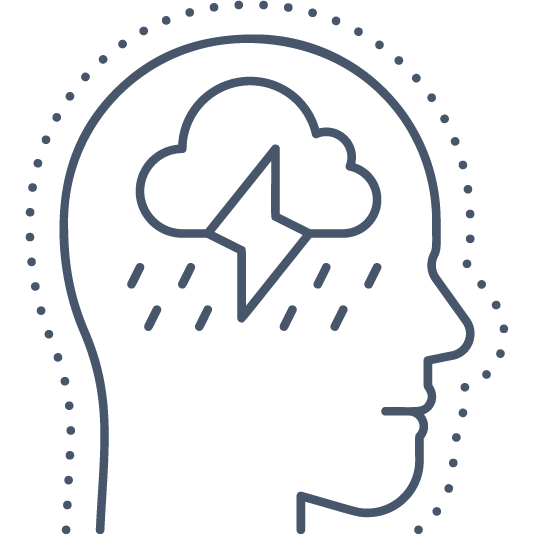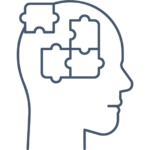
At Level Up Wellness Group, we provide specialized ADHD assessments tailored to meet your unique needs. Our approach ensures accurate diagnosis and a comprehensive understanding of ADHD, empowering individuals and families to move forward with confidence. Choose from two categories of ADHD assessment options:
Our ADHD assessors specialize in evaluating children, youth, and adults for ADHD using evidence-based tools and techniques. Choose from the following options:
Led by our nurse practitioners with expertise in ADHD, this option focuses on both medical and psychiatric aspects of ADHD. Services are available for children, youth, and adults.






In children, ADHD is often recognized by hyperactivity, difficulty focusing, and impulsive behavior. Children with ADHD may struggle with tasks that require sustained mental effort, following instructions, or sitting still. Hyperactivity, particularly, is more visible in boys, leading to more frequent diagnoses among males. Girls, on the other hand, are more likely to exhibit inattentive symptoms, often leading to underdiagnosis or late diagnosis because their behavior may not be as disruptive. Research by Hinshaw and colleagues (2014) suggests that girls with ADHD often mask or camouflage their symptoms, which makes identification more challenging.


During adolescence, hyperactive symptoms may decline, but impulsivity and inattention often persist. Teenagers with ADHD frequently struggle with time management, academic achievement, and emotional regulation. Adolescents may engage in risky behaviors, experience difficulties with peer relationships, and face greater challenges with self-esteem. Studies have indicated that untreated ADHD can increase the risk of substance abuse and involvement in legal issues during this developmental stage. Adolescents also face unique challenges as they transition from parental supervision to increased independence.
ADHD often presents differently in adults compared to children. Adults may experience persistent difficulties with organization, time management, and maintaining focus on tasks. They may also struggle with impulsive decision-making, emotional regulation, and restlessness. ADHD symptoms can lead to difficulties in maintaining steady employment, healthy relationships, and managing daily life tasks. Many adults may not realize they have ADHD until later in life, often after seeking treatment for depression or anxiety. Studies suggest that undiagnosed ADHD in adults can have significant impacts on mental health, quality of life, and even physical health outcomes.

In later life, ADHD symptoms may be complicated by the aging process. Some symptoms, such as impulsivity, tend to wane, but challenges with memory, executive function, and cognitive tasks may persist or worsen. There is also evidence that untreated ADHD can exacerbate age-related cognitive decline, increasing the risk of conditions like dementia.
Recent studies have focused on the impact of undiagnosed and untreated ADHD, particularly among specific populations such as offenders, women, and older adults. In the UK, for example, a study is examining repeated offenders within the criminal justice system to determine how many meet the criteria for ADHD. Emerging research indicates that a significant proportion of offenders have undiagnosed ADHD, and untreated ADHD may increase the likelihood of impulsive, risky behavior, which contributes to recidivism. This has led to discussions about the need for screening and treatment of ADHD within this population as a potential way to reduce re-offending rates (Young et al., 2020).
Other studies are exploring how undiagnosed ADHD affects women’s lives, as females are more likely to be diagnosed later in life, often during perimenopause or after a child is diagnosed with ADHD. Hormonal changes during menopause, for example, can exacerbate ADHD symptoms, leading to difficulties in daily functioning. Treatment approaches for these women are being investigated to determine the role of hormone therapy alongside traditional ADHD treatments like stimulant medications.
ADHD (Attention-Deficit/Hyperactivity Disorder) has historically been underdiagnosed in women and girls, largely due to the ways symptoms are expressed and often masked. While ADHD is often associated with disruptive behaviour, the presentation in females can be more subtle and masked by social strategies such as camouflaging, where individuals work hard to hide their symptoms, leading to delayed or missed diagnosis. Here’s how ADHD can show up in girls, teenagers, and women, particularly as they navigate major hormonal transitions like perimenopause and menopause.

These strategies may help avoid detection but can also lead to exhaustion, anxiety, and low self-esteem over time, as they require a great deal of mental energy and self-regulation.

In childhood, girls with ADHD may not show the overt hyperactivity or disruptive behavior often seen in boys. Instead, their struggles might look like:
Girls often internalize their struggles, leading to feelings of inadequacy or frustration that may go unnoticed by teachers or caregivers. Since they may still perform well academically, the signs of ADHD are frequently misattributed to laziness or lack of motivation.
During adolescence, hormones such as estrogen and progesterone fluctuate, which can exacerbate ADHD symptoms. Teen girls may experience:
Teen girls often continue to use camouflaging techniques, focusing on social acceptance and conformity. This further mask their ADHD and can lead to burnout as they transition to adulthood.
ADHD in adult women can become particularly challenging during perimenopause and menopause, as hormone levels fluctuate significantly. Estrogen plays a crucial role in cognitive functioning, including attention, memory, and executive functioning, all areas affected by ADHD. As estrogen declines, women may experience:
During this time, many women may feel like their ADHD symptoms are finally surfacing or becoming unmanageable, even if they have never been diagnosed before. The shift in hormone levels during perimenopause and menopause can amplify the cognitive challenges and emotional instability that often accompany ADHD, making it a particularly vulnerable time for women.

One of the biggest challenges in diagnosing ADHD in females is the overemphasis on disruptive behavior in early assessments. Because girls and women are often socialized to be compliant and nurturing, they may not exhibit outward behavioral problems. Instead, their struggles may manifest in:
This focus on how females “get along with others” or behave in social situations often leads to a missed diagnosis, as attention is not given to the internalized distress or the less visible symptoms of ADHD.
No matter which path you take, knowing how your brain works and the best strategies to support it can make a world of difference. Whether it’s through diagnosis alone, medication, supplements, or in-depth assessments, we are here to help you make informed decisions and find the right path forward.

Includes Generalized Anxiety Disorder (GAD), Social Anxiety, and Panic Disorder. Many individuals with ADHD experience anxiety due to difficulties managing tasks and social situations.

Major Depressive Disorder (MDD) and Dysthymia (Persistent Depressive Disorder) often co-occur with ADHD, especially in adolescents and adults. Challenges in managing ADHD symptoms can contribute to feelings of hopelessness and low self-esteem.

More common in children with ADHD, particularly those with hyperactive-impulsive symptoms. ODD involves persistent anger, irritability, and defiance toward authority figures.

ADHD frequently coexists with dyslexia, dyscalculia, or other specific learning disabilities, making academic achievement challenging for many children and adolescents.

ADHD and ASD can co-occur, particularly in individuals who struggle with executive functioning, social interactions, and emotional regulation.

Bipolar Disorder can sometimes be misdiagnosed or co-exist with ADHD, particularly when mood instability is prominent.

Problems like insomnia and sleep apnea are common among individuals with ADHD, which can exacerbate attention and emotional regulation issues.

Adolescents and adults with ADHD are at higher risk for developing substance use disorders, often as a form of self-medication for unmanaged ADHD symptoms.
These are the most frequent conditions found alongside ADHD and require careful assessment to manage both ADHD and the co-occurring conditions effectively.
When ADHD is not identified and treated, both boys and girls face various day-to-day issues and long-term risks across the lifespan. The impact may differ based on gender due to the ways ADHD symptoms manifest and are socially received. Here are some of the common issues and risks across different life stages:



Addressing ADHD early and implementing proper treatment strategies can mitigate these risks and improve outcomes for both boys and girls throughout their lives. Treatment can enhance emotional regulation, improve academic and career achievements, and support healthier relationships and social development.
Understanding whether you or your child may have ADHD (Attention-Deficit/Hyperactivity Disorder) is a journey that requires careful consideration of the type of support you’re looking for. Use the guide below to help navigate the best path for you or your loved one.
If someone in the immediate family has ADHD, there is a much greater risk that your child will have ADHD due to the largely genetic element of ADHD.
Not Interested in Medication or Psychological Support?
If you’re seeking confirmation of ADHD but are not interested in treatment options like medication or therapy, you can schedule an ADHD diagnostic assessment. This will give you clarity on whether you or your child has ADHD without further involvement in treatments or psychological care
Best For: Individuals or parents who simply want a diagnosis for personal knowledge or to understand their challenges better.
Interested in Diagnosis and Medication and/or Holistic Support?
If you’re seeking not only a diagnosis but are also considering medication and holistic (supplements) as part of the treatment, book an appointment with our nurse practitioner. They can provide a thorough diagnosis, discuss medication options, and help manage symptoms with prescribed treatments.
Best For: Individuals or parents are open to using medication and supplements as a tool to manage ADHD symptoms.
Looking to Understand How ADHD Impacts Learning and Life?
If you or your child is facing difficulties in multiple environments (home, school, work) and you want to know more about how your brain operates, we recommend a psychoeducational assessment. This assessment not only helps diagnose ADHD but also explores other cognitive and emotional factors. You’ll gain insight into your neurodivergent brain and how to support it in different aspects of life.
Best For: Parents or individuals seeking a comprehensive understanding of learning, emotional, and social challenges, along with recommendations for educational and environmental accommodations.
If your child has struggles with learning in any manner: speed, comprehension, focus, or attention, this option is highly recommended. At least 50 percent of children who have ADHD have a learning disorder. This needs to be identified and evidence-based strategies put in place.
Need support for post-secondary environments
It is best to book in with our nurse practitioner who can take a holistic approach to managing your symptoms. This includes the possibility of discussing medication, supplements, vitamins and then therapy to support your needs. Bloodwork will likely be order to understand the link of what is occurring and to provide you with a specific plan to meet your needs.